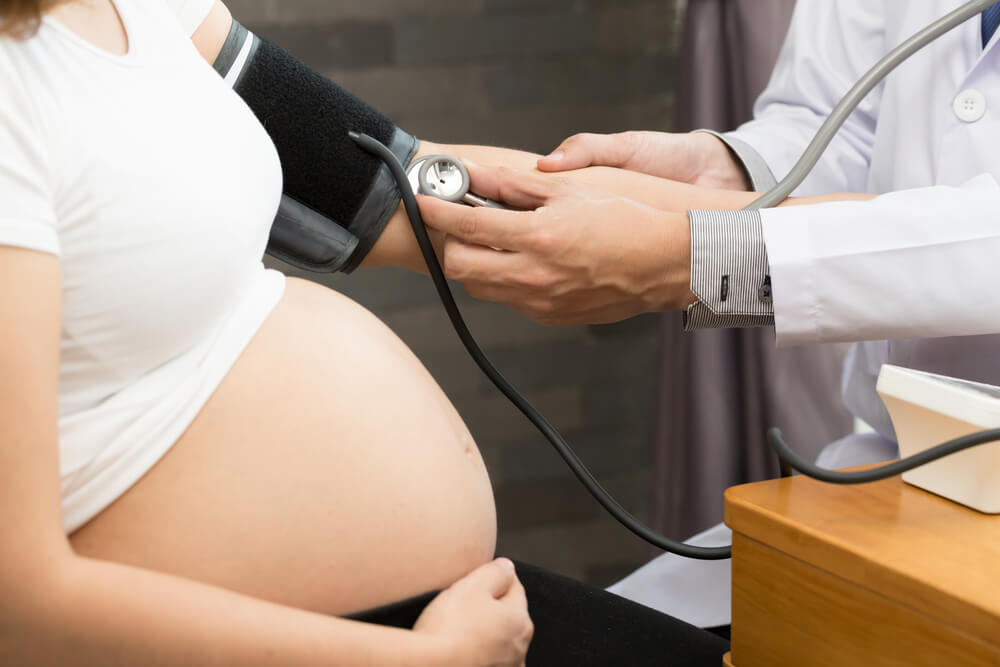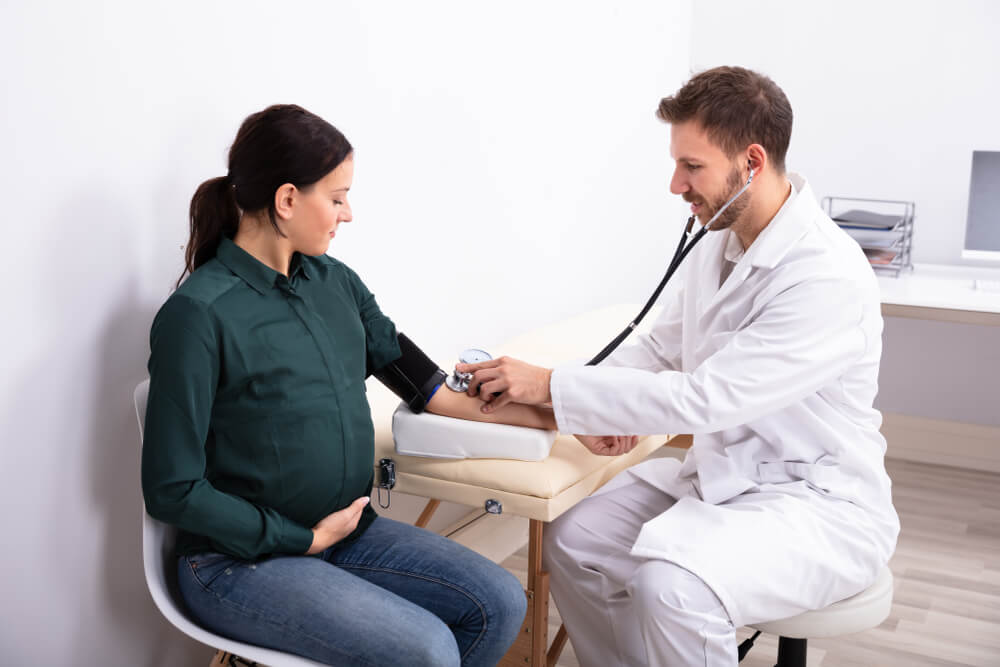Hypertension, or high blood pressure, is a condition that might not always make women feel unwell, but it can pose significant risks, particularly during pregnancy. In this informative and formal article, we will discuss the various aspects of high blood pressure during pregnancy, including its levels, potential complications, and essential steps to take before, during, and after pregnancy to ensure the well-being of both the mother and the baby.
After finishing up, feel free to contact the excerpts at My OBGYN Specialists if you have any more questions about gestational hypertension, preeclampsia, or anything else.
Understanding High Blood Pressure Levels/What Causes High Blood Pressure During Pregnancy?

High blood pressure during pregnancy is categorized into three levels:
- Mild Hypertension: Blood pressure readings fall between 140/90 and 149/99 mmHg (millimeters of mercury). While this level might necessitate regular monitoring, it typically does not require immediate treatment.
- Moderate Hypertension: Blood pressure falls between 150/100 and 159/109 mmHg.
- Severe Hypertension: Blood pressure reaches 160/110 mmHg or higher.
For women who are already taking medication for high blood pressure, it’s crucial to consult with a healthcare provider before planning to become pregnant. Adjustments to medications may be necessary, as some blood pressure medications may not be entirely safe during pregnancy. These medications can potentially reduce blood flow to the placenta, affecting the baby.
If you discover that you are already pregnant while taking blood pressure medication, inform your doctor immediately, as they may need to switch you to a safer medication.
Antenatal Monitoring
Throughout pregnancy, it is vital that your healthcare team closely monitors your blood pressure to ensure it does not adversely affect your baby’s growth and to screen for a condition known as preeclampsia. Consistent attendance at all prenatal appointments is crucial.
Throughout these check-ups, your healthcare provider, whether your doctor or midwife, will consistently assess your blood pressure and analyze your urine for protein. Following the 20-week mark of your pregnancy, you might be advised to undergo a PlGF (placental growth factor) test to exclude the possibility of preeclampsia.
In the first half of pregnancy, blood pressure typically decreases. Consequently, there might be a possibility of temporarily discontinuing medication under medical supervision.
Managing High Blood Pressure
You can take proactive measures to manage high blood pressure during pregnancy.
- Physical Activity: Engaging in regular physical activities such as walking or swimming can help maintain your blood pressure within a normal range. It is essential to consult with your healthcare provider before starting any exercise regimen during pregnancy.
- Balanced Diet: Adopting a balanced diet and limiting salt intake can contribute to blood pressure reduction.
- Dietary Supplements: While there isn’t sufficient evidence to confirm the effectiveness of dietary supplements like magnesium, folic acid, or fish oils in preventing high blood pressure, maintaining a well-balanced diet remains essential.
Preeclampsia: A Potential Complication
Preeclampsia is a condition that commonly affects pregnant women, often occurring after the 20th week of pregnancy. It is associated with a placenta malfunction, causing a rise in blood pressure. If left untreated, preeclampsia can be perilous for both the mother and the baby.
Several factors may increase your risk of preeclampsia, including a history of high blood pressure before pregnancy, a prior experience of preeclampsia, or a family history of preeclampsia.
Symptoms of preeclampsia encompass headaches, vision changes, upper abdominal pain, nausea, vomiting, swelling of the face or hands, sudden weight gain, and difficulty breathing. However, some women may not experience any symptoms, underscoring the importance of regular medical check-ups.
Labor and Delivery
If you are taking blood pressure medication throughout pregnancy to control your hypertension, it is recommended to continue it during labor. The frequency of blood pressure monitoring during labor may vary based on the severity of your condition, ranging from hourly checks for mild to moderate hypertension to more frequent monitoring for severe hypertension. In some cases, healthcare providers may suggest interventions like forceps, ventouse, or cesarean section to deliver your baby.
Postpartum Care
After childbirth, postpartum care is equally important in managing high blood pressure. If you had hypertension before becoming pregnant, your treatment should be evaluated within two weeks after childbirth. If you developed high blood pressure during pregnancy and are still taking medication after giving birth, you should receive a follow-up appointment with a doctor. This is to assess whether your treatment needs any adjustments.
For all individuals with hypertension during pregnancy, a check-up with a general practitioner or specialist should be scheduled between six to eight weeks after childbirth, separate from the standard six-week postnatal check.
Breastfeeding
If you need to continue taking hypertension medication while breastfeeding, you can generally do so with appropriate guidance from your doctor. It’s important to note that these medications can pass into breast milk. Still, usually at very low levels, and there is typically no specific safety concern or evidence of harm associated with them. To understand the specifics of your medication and its safety during pregnancy, consult your healthcare provider.
Preventing and Managing High Blood Pressure
High blood pressure is a common concern during pregnancy, but it is preventable and manageable with the right approach. By working closely with your healthcare team, you can navigate the challenges associated with high blood pressure before, during, and after pregnancy.
Before Pregnancy:
- Plan your pregnancy with your healthcare provider, disclosing any pre-existing health conditions and medications you may take.
- Focus on maintaining a healthy weight through a balanced diet and regular physical activity.
During Pregnancy:
- Prioritize early and regular prenatal care, attending every appointment with your doctor or healthcare professional.
- Consult your healthcare provider about the safety of your medications during pregnancy, and never stop or start any medication without professional guidance.
- Keep track of your blood pressure at home, and contact your doctor if you notice any unusual readings or symptoms of preeclampsia.
After Pregnancy:
Pay close attention to your health after childbirth, especially if you have high blood pressure during pregnancy. Notify your healthcare provider immediately if you experience symptoms of postpartum preeclampsia.
Types of High Blood Pressure Conditions Before, During, and After Pregnancy

Your healthcare provider should monitor and diagnose various types of high blood pressure conditions throughout your pregnancy journey:
Chronic Hypertension During Pregnancy
This condition indicates having high blood pressure either before pregnancy or before the 20-week mark of pregnancy. Chronic hypertension during pregnancy may lead to the development of preeclampsia during the second or third trimester.
Gestational Hypertension
What causes high blood pressure during pregnancy? Gestational hypertension presents as elevated blood pressure exclusively during pregnancy, with no associated protein in the urine or other heart or kidney issues. Typically, it is diagnosed after the 20-week mark or nearing delivery and tends to resolve after childbirth. However, some women with gestational hypertension may face an increased risk of developing chronic hypertension later on.
Preeclampsia/Eclampsia
Preeclampsia is characterized by the abrupt onset of high blood pressure and the presence of protein in the urine or other complications after the 20-week mark of pregnancy. This condition can affect women who previously had normal blood pressure or those with chronic hypertension. In severe cases, preeclampsia can lead to eclampsia, a medical emergency characterized by seizures.
Conclusion
High blood pressure during pregnancy is a significant concern that necessitates careful management to safeguard the health of both the mother and the baby. By adhering to a comprehensive care plan before, during, and after pregnancy, in close collaboration with healthcare professionals, individuals can take proactive steps to prevent, monitor, and manage high blood pressure, ensuring a safer and healthier pregnancy journey.
That being said, you can always contact us and discuss your options.


